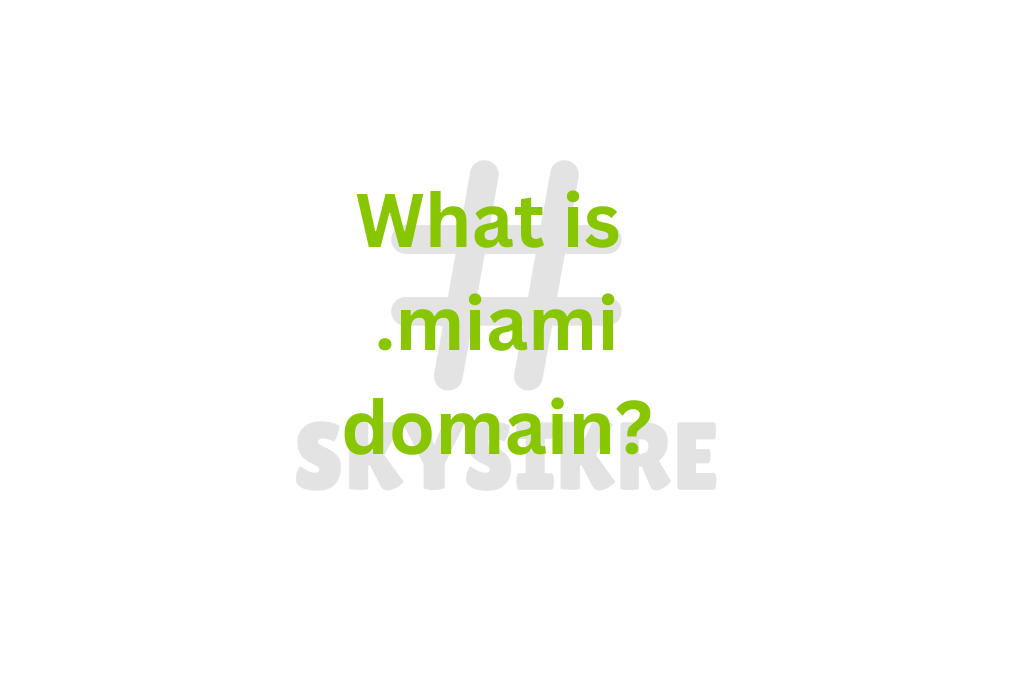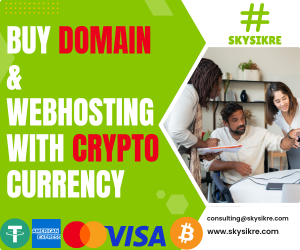Introduction to .Miami Domains
The .Miami domain is a specialized geographical top-level domain (gTLD) that signifies a connection to the vibrant city of Miami, Florida. Launched as a part of the wider expansion of gTLDs, .Miami serves to represent entities, businesses, and individuals who are either located in Miami or have a notable relationship with the area. This domain extension plays a crucial role in local branding, ensuring that websites using .Miami can convey a strong geographical identity that resonates with both residents and visitors alike.
In contrast to generic domains such as .com or .net, which do not provide localized context, the .Miami domain is tailored for those wishing to promote their products, services, or personal initiatives distinctly within the Miami locale. For businesses, adopting a .Miami domain can enhance their visibility and relevance in local searches, making it an attractive option for companies looking to effectively target their audience in a specific geographical area.
The strategic significance of the .Miami domain extends beyond mere identification; it fosters a sense of community and belonging among its users. As industries, including tourism, hospitality, and culture, thrive in Miami, the .Miami domain allows organizations and individuals to stake their claim in the digital landscape, enhancing their outreach and connection with both existing and potential clients. Furthermore, the growth of such geographical domains is indicative of the rising importance of local SEO strategies, as businesses increasingly recognize the need to cater to regional markets.
In addition to bolstering local identities, .Miami domains showcase the city’s unique characteristics and appeal, encompassing everything from its cultural diversity to its thriving economy. Consequently, a .Miami domain not only serves as an online address but also encapsulates the rich tapestry of what Miami represents in today’s interconnected world.
History and Evolution of the .Miami Domain
The .Miami domain, a unique top-level domain (TLD), was introduced as part of a broader initiative to provide geographic-based domain extensions that represent specific regions and communities. Its inception can be traced back to the application process initiated by the Internet Corporation for Assigned Names and Numbers (ICANN) in 2012, when the organization opened the door for new TLDs to be established. Recognizing the increasing importance of local identity in a global digital landscape, .Miami was proposed to cater to the flourishing cultural, economic, and social scene of this vibrant city.
Officially launched in 2015, the .Miami domain aimed to create an online identity specifically tailored to individuals, businesses, and organizations affiliated with Miami. The motivation behind creating this TLD was not only to strengthen local branding but also to foster a sense of community among residents and businesses. The introduction of .Miami represented a shift toward promoting geographic relevance in digital spaces, allowing for more localized online engagement.
Since its launch, the .Miami domain has grown significantly, attracting a diverse array of users ranging from small enterprises to large corporations. Notable milestones in its development include partnerships with local businesses, tourism boards, and cultural organizations, which have utilized the domain to enhance their online presence. The .Miami domain has become synonymous with innovation, creativity, and the vibrant life that the city offers, showcasing the region’s unique character on a global stage.
In recent years, efforts to promote the .Miami domain have intensified, demonstrating the TLD’s ability to adapt to the evolving digital landscape. This growth trajectory highlights the ongoing relevance and importance of regional domain extensions in establishing a local identity online.
Who Can Register a .Miami Domain?
The .Miami domain extension is designed to represent the vibrant city of Miami and its distinctive culture, making it particularly valuable for a range of individuals and organizations. Eligibility for registering a .Miami domain is primarily open to anyone with a valid interest in the Miami area. This includes residents, businesses, and entities that operate or are connected to Miami in any meaningful way.
Private individuals interested in establishing an online presence related to Miami can easily apply for a .Miami domain. This could include artists, bloggers, and influencers who create content reflecting local culture, lifestyle, or tourism. Furthermore, local residents seeking to promote their services, such as real estate agents or event planners, may also find a .Miami domain advantageous for targeting the local audience effectively.
For organizations, the .Miami domain extension offers a robust platform for businesses that operate in or cater to the Miami market. This includes restaurants, travel agencies, and local retail stores, among others. By using a .Miami domain, these businesses can enhance their online visibility and demonstrate their community involvement. Additionally, non-profit organizations and local government entities also have the opportunity to register a .Miami domain, facilitating better engagement with community members and stakeholders.
While registration does not impose many stringent requirements, applicants must provide accurate and verifiable information during the registration process. It is crucial to note that, similar to other domain extensions, compliance with the terms and conditions set by the domain registry is required. As long as applicants adhere to these guidelines and can prove their legitimate interest in the Miami area, acquiring a .Miami domain can be both accessible and beneficial.
Benefits of Using a .Miami Domain
The .Miami domain offers numerous advantages tailored for businesses, local organizations, and individuals who wish to establish a presence in this vibrant city. One of the most significant benefits is the strong sense of community identity that a .Miami domain fosters. By incorporating the city’s name directly into their web address, businesses and organizations can convey their allegiance to the local culture, attracting clients and customers who value community involvement. This identity can enhance brand loyalty and support from local residents, promoting a sense of belonging.
In addition to community identity, a .Miami domain can significantly enhance local search engine optimization (SEO). Search engines increasingly prioritize location-based results, and having a domain that reflects a specific geographic area can improve visibility in local search queries. This is especially beneficial for small businesses aiming to attract customers from their immediate vicinity. By utilizing a .Miami domain, organizations signal to search engines and users alike their commitment to serving the Miami area, potentially leading to higher rankings in localized search results.
Moreover, the .Miami domain plays a crucial role in brand positioning. It allows businesses to differentiate themselves in a saturated marketplace by associating their brand with Miami itself, a city renowned for its diversity and dynamism. A .Miami domain serves not only as a digital identifier but also as a marketing tool that can effectively communicate the essence of a brand. As organizations leverage this unique domain extension, they can cultivate an image that resonates with both local customers and those from beyond the immediate area. Overall, the .Miami domain is an invaluable asset that contributes to a strong regional identity, enhanced SEO, and effective brand positioning.
How to Register a .Miami Domain
Registering a .Miami domain is a straightforward process that can enhance your online presence, especially for businesses and individuals who want to connect with the vibrant Miami community. To begin your registration journey, one should first select an appropriate domain registrar. It is essential to choose a reputable registrar that is accredited by the Internet Corporation for Assigned Names and Numbers (ICANN) or has the authority to sell .Miami domains. Popular options include GoDaddy, Namecheap, and 1&1 IONOS; each provides a user-friendly experience with competitive pricing.
Once you have selected a registrar, you can commence the domain registration process. Start by searching for your desired domain name in the designated search bar on the registrar’s website. Keep in mind that a unique name is crucial, as many common phrases or names may already be registered. If your first choice is unavailable, consider using relevant keywords, variations, or even using local Miami-specific terms that reflect your brand identity.
After selecting a domain name, you will need to complete the registration form, providing essential information such as your name, address, and contact details. It is also advisable to consider additional services offered by your selected registrar, such as privacy protection, which conceals your personal information from public databases.
Upon completing the registration form, review the information for accuracy and proceed to payment. Most registrars offer various payment options, making this step convenient. Once your payment is confirmed, you will receive a confirmation email with details regarding your new .Miami domain.
Finally, maintaining your .Miami domain is critical for ensuring its continued ownership. Regularly renew the domain before expiration, and update your contact information as necessary to prevent issues related to domain ownership. By following these steps, you can effectively register and manage your .Miami domain, strengthening your connection to the dynamic Miami community.
Practical Uses of .Miami Domains
The introduction of the .Miami domain extension has opened up a plethora of opportunities for individuals, businesses, and organizations operating in or representing the vibrant Miami area. This domain is not merely a web address; it represents an identity that resonates with local culture, tourism, and community initiatives.
For businesses, adopting a .Miami domain can enhance local visibility and foster a region-specific brand identity. For example, restaurants, fashion boutiques, and service providers can leverage this extension to connect with target audiences seeking Miami-centric offerings. A local restaurant might opt for “TasteOfMiami.miami” to emphasize its dedication to regional cuisines, attracting both residents and tourists alike.
Communities can also efficiently showcase their initiatives through .Miami domains. Neighborhood associations and local nonprofits can create websites with extensions such as “MiamiBeachCivic.miami,” which serve as platforms for information dissemination, event announcements, and community engagement. This not only cultivates a sense of belonging but also encourages participation in local affairs.
Tourism is another crucial sector that benefits significantly from .Miami domains. Tourism boards and event organizers can utilize this extension to promote various attractions and events across the city. For example, an arts festival might use a domain like “ArtWeekMiami.miami” to highlight schedules, participating artists, and ticketing options, thereby streamlining communication with potential visitors.
Furthermore, events ranging from music festivals to food fairs often adopt .Miami domains to create a cohesive online presence that encapsulates the essence of Miami. These domains not only serve functional purposes but also contribute to the city’s digital landscape by representing its diverse offerings. With its unique characteristics and regional focus, the .Miami domain extension effectively serves local interests across multiple sectors.
SEO Considerations for .Miami Domains
When integrating a .Miami domain into your online strategy, understanding its implications for search engine optimization (SEO) is crucial. Firstly, the geographic specificity of a .Miami domain enhances local relevance. This means that businesses targeting customers in Miami will find it easier to rank higher on search engine results pages (SERPs) when local keywords are incorporated into their site content. Utilizing keywords that reflect both your business niche and local relevance, such as “Miami restaurants” or “Miami real estate,” can significantly boost your visibility among local searches.
Another essential consideration is the role geographic domains, like .Miami, play in organic search results. Search engines like Google prioritize relevance, and having a local domain implies to search engines that your website provides valuable information or services to users within that location. Consequently, incorporating geographic identifiers in your content and using the .Miami extension effectively communicates your business’s local focus, potentially improving rankings against competitors without local extensions.
To fully leverage a .Miami domain for better visibility, keep the following tips in mind. First, ensure that your website content prominently features local keywords throughout various parts of the site, including headings, meta descriptions, and alt texts. This practice not only enhances keyword relevance but also emphasizes your connection to the Miami area. Secondly, engage with local online communities and platforms; building backlinks from reputable local websites can further elevate your domain authority. Lastly, utilize Google My Business and other local listings to boost your SEO efforts, ensuring accurate information about your business is readily available to potential customers.
By optimizing your website around local SEO tactics while leveraging the unique advantage of a .Miami domain, you can position your business more strategically to attract local traffic and improve overall online visibility.
Case Studies: Successful .Miami Domain Usage
The .Miami domain has emerged as a powerful digital asset for various businesses and initiatives within the vibrant city of Miami. By adopting this unique extension, organizations not only enhance their local presence but also connect more deeply with the community. This section explores several case studies that exemplify the successful use of .Miami domains and the benefits derived from this innovative approach.
One notable example is the restaurant chain “Taste of Miami,” which transitioned from a generic .com domain to tasteofmiami.miami. This change proved to be significant in branding and marketing efforts. The domain not only reflected the essence of their Miami-style cuisine but also improved search engine visibility specifically for local customers. As a result, Taste of Miami experienced a surge in online reservations and foot traffic, contributing to a substantial increase in overall sales.
Another impactful case is the initiative “Miami Beach Clean,” which adopted miamibeachclean.miami as its digital identity. This community-driven project focuses on environmental conservation and engaging residents in local clean-up activities. The .Miami domain fostered a sense of locality among participants and enabled easy access to information about events and volunteer opportunities, which ultimately galvanized community participation. The initiative saw a marked improvement in volunteer turnout and elevated awareness regarding Miami Beach’s environmental issues.
Moreover, a tech startup named “Miami Tech Innovators” leveraged the domain miamitechinnovators.miami to position itself as a key player in Miami’s burgeoning tech ecosystem. By establishing this focused online presence, they effectively attracted partnerships, investment opportunities, and talent from within the region. The .Miami domain has been instrumental in solidifying their brand identity and reinforcing the startup’s commitment to fostering innovation in the local community.
These case studies highlight the positive impact of .Miami domains on branding, community engagement, and overall business growth. The extension serves not merely as a web address but as a strategic tool for organizations looking to strengthen their ties with the city and its residents.
The Future of the .Miami Domain
The .Miami domain has emerged as an integral part of the digital identity of Miami, reflecting the vibrant culture, diverse communities, and dynamic economy of the region. As technology advances and the internet continues to play a crucial role in our everyday lives, the future of the .Miami domain appears promising, albeit not without challenges.
One significant trend shaping the future of the .Miami domain is the increasing importance of localized online identities. Businesses and organizations looking to establish a robust online presence can leverage the .Miami domain to connect more closely with their target audience. By utilizing a .Miami domain, local businesses can enhance their brand visibility, foster community engagement, and signal their commitment to the Miami area. This localized approach will likely contribute to the growth of digital entrepreneurship within the region.
Challenges, however, may loom on the horizon. As the .Miami domain gains popularity, competition could intensify, resulting in potential oversaturation of the market. New startups may find it challenging to stand out if many similar businesses adopt this domain extension. Furthermore, with the rise of cyber threats, ensuring cybersecurity and protecting domain registrations will be critical for users of the .Miami extension. Understanding these challenges will be vital for stakeholders looking to capitalize on digital opportunities while safeguarding their online presence.
Despite these challenges, opportunities for growth remain abundant. The increasing reliance on digital communication post-pandemic has prompted many businesses to shift towards online operations, resulting in a higher demand for web domains. Given Miami’s position as a cultural and economic hub, the potential for establishing a strong identity through the .Miami domain is significant. This could attract a broader range of entities, from startups to established corporations, looking to benefit from the unique brand that the .Miami domain represents.
In conclusion, the future of the .Miami domain is characterized by a landscape filled with both opportunities and challenges. As digital trends continue to evolve, it will be imperative for individuals and businesses in the Miami area to adapt, leveraging this unique domain to enhance their online presence while navigating the complexities of the digital world.






